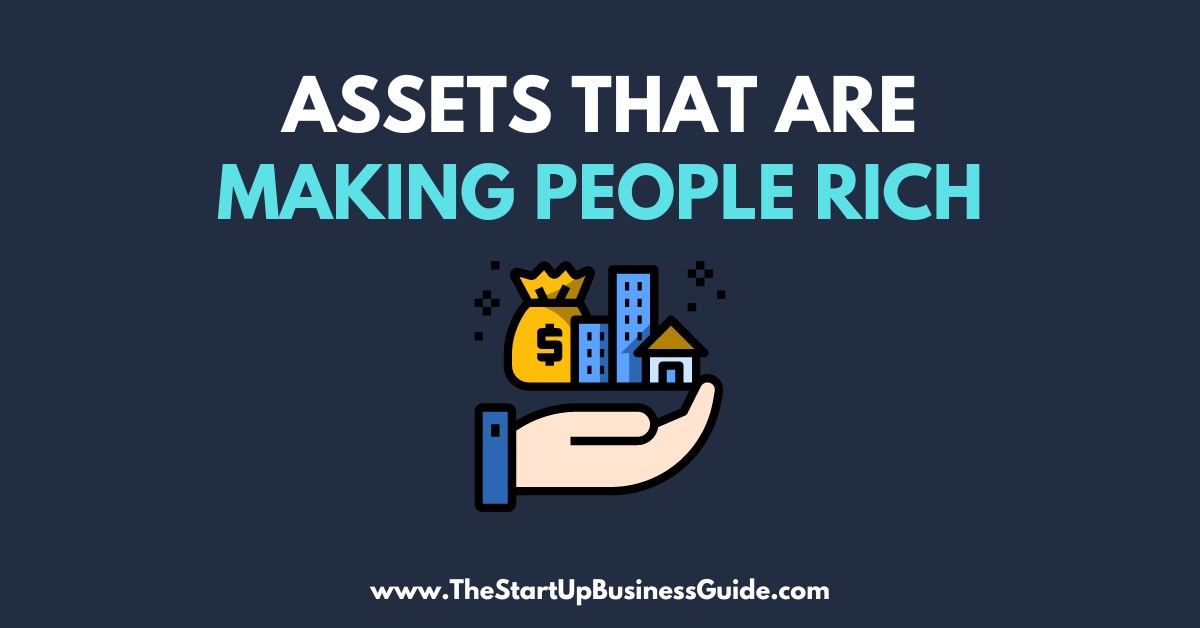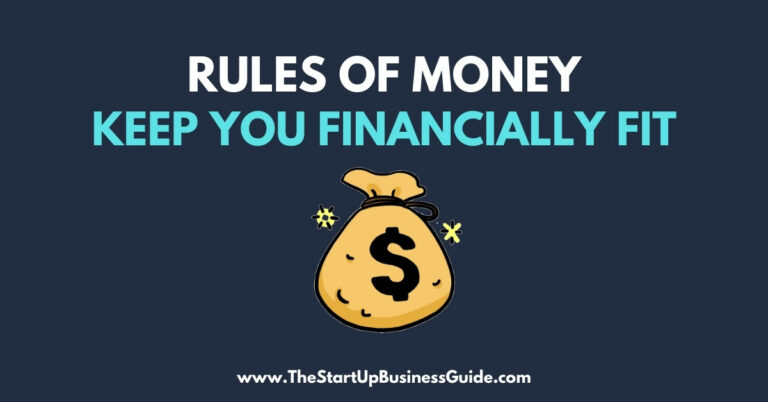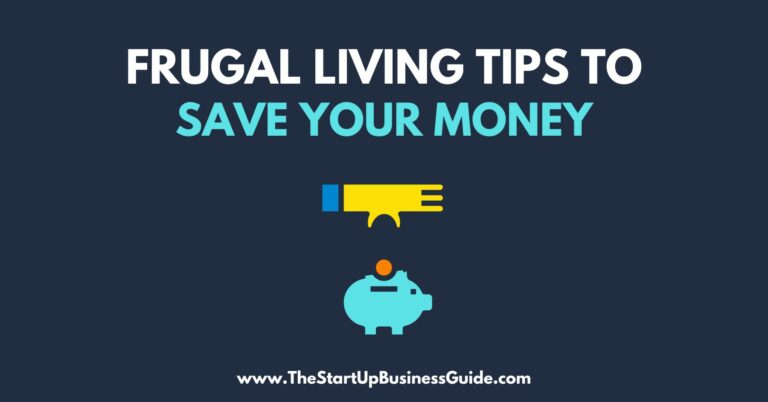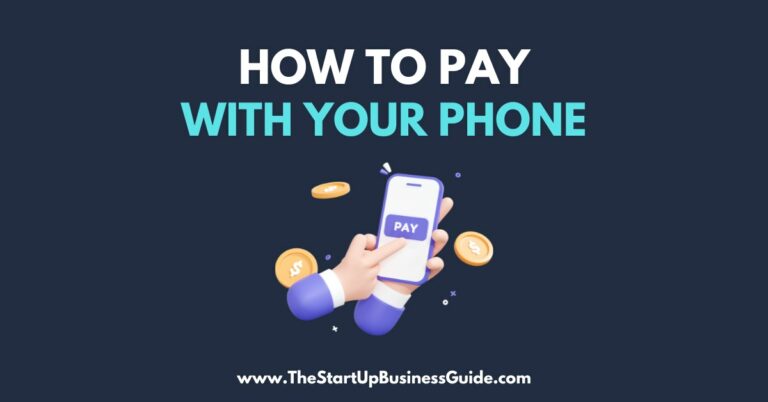14 Assets That Are Making People Rich

Welcome to our blog post on 14 assets that are making people rich.
From real estate to stocks, bonds, and cryptocurrency, we will be discussing a variety of assets and providing tips on how to get started in each one.
Keep reading to learn more about the different ways to invest your money and potentially grow your wealth.
1. Real Estate
Real estate is one of the most popular and profitable assets out there.
It can be a great way to build wealth over time, as well as provide a steady stream of income through rental properties.
There are several types of real estate investments, including:
- Rental Properties: This is when you purchase a property and rent it out to tenants. The rent you collect can be used to cover the mortgage and other expenses, and any remaining profit can be used for additional investments or savings.
- REITs: Real estate Investment Trusts (REITs) are a type of investment that allows individuals to invest in a pool of properties without having to purchase one themselves. REITs are traded on the stock market and provide a way for investors to earn passive income through rental properties.
If you’re interested in getting started in real estate investing, here are some tips:
Start small: It’s best to start with a single rental property or a small investment in a REIT before diving into larger investments.
Do your research: Make sure to research the local real estate market and the neighborhoods where you’re considering investing. Look into the average rent and property values, as well as any upcoming developments or changes that may impact the area.
Get a mentor: It can be helpful to find an experienced real estate investor who can provide guidance and advice.
2. Stocks
Stocks are another popular and profitable asset.
They represent a share of ownership in a company, and as the company grows, so does the value of the stock.
There are two main types of stocks:
- Blue chip stocks: These are stocks from well-established companies with a strong track record of performance. They are considered low-risk investments and are often a good choice for beginner investors.
- Growth stocks: These are stocks from companies that are expected to experience rapid growth in the future. They can be riskier than blue chip stocks, but also have the potential for higher returns.
Here are some tips for getting started in stock investing:
- Start small: It’s best to start with a small investment in a few different stocks before committing a large amount of money.
- Do your research: Make sure to research the companies you’re considering investing in. Look at their financial statements, management team, and industry trends.
- Diversify: Don’t put all your eggs in one basket. Invest in a variety of stocks to spread out the risk.
3. Bonds
Bonds are debt securities issued by companies or government entities.
They allow investors to lend money to the issuer in exchange for regular interest payments and the return of the principal at maturity.
There are two main types of bonds:
Corporate bonds: These are bonds issued by companies to raise capital. They can be riskier than government bonds, but also have the potential for higher returns.
Government bonds: These are bonds issued by government entities, such as the US Treasury. They are considered low-risk investments but have lower returns than corporate bonds.
Here are some tips for getting started in bond investing:
Start small: It’s best to start with a small investment in a few different bonds before committing a large amount of money.
Do your research: Make sure to research the bonds you’re considering investing in. Look at the credit rating of the issuer, the interest rate, and the maturity date.
Diversify: Like with stocks, it’s important to diversify your bond portfolio by investing in a variety of bonds with different maturities and credit ratings.
4. Cryptocurrency
Cryptocurrency is a digital or virtual currency that uses cryptography for security.
It is decentralized, meaning it is not controlled by any government or institution. The most well-known cryptocurrency is Bitcoin, but there are many other types such as Ethereum, Litecoin, and Ripple.
Cryptocurrency can be a profitable asset, but it is also considered a high-risk investment.
The value of cryptocurrencies can be extremely volatile, and there is always the potential for hacking or fraud.
Here are some tips for getting started in cryptocurrency investing:
Do your research: Make sure to research the different types of cryptocurrencies and the technology behind them before investing.
Start small: It’s best to start with a small investment and not to invest more than you can afford to lose.
Keep your investments safe: Make sure to store your cryptocurrencies in a safe and secure wallet.
5. Collectibles
Collectibles, such as art, coins, stamps, and sports memorabilia, can also be a profitable asset.
The value of collectibles can appreciate over time, and they can also provide enjoyment and a sense of satisfaction for the collector.
However, it’s important to note that not all collectibles are created equal. Some may have a higher potential for appreciation than others, and it can be difficult to predict the future value of a collectible.
Here are some tips for getting started in collectible investing:
Do your research: Make sure to research the different types of collectibles and the market for them before investing.
Start small: It’s best to start with a small investment in a single collectible before committing a large amount of money.
Find a reputable dealer: Make sure to purchase collectibles from a reputable dealer to ensure authenticity and fair pricing.
6. Commodities
Commodities, such as gold, oil, and agricultural products, can be a profitable asset due to their physical value and potential for price appreciation.
Commodities can also act as a hedge against inflation.
However, the value of commodities can be affected by a variety of factors, such as natural disasters and changes in supply and demand.
Here are some tips for getting started in commodity investing:
Do your research: Make sure to research the different types of commodities and the market for them before investing.
Start small: It’s best to start with a small investment in a single commodity before committing a large amount of money.
Consider ETFs: Exchange-traded funds (ETFs) that track a basket of commodities can provide a way for individuals to invest in multiple commodities at once.
7. Businesses
Investing in a business can be a great way to build wealth and achieve financial freedom. There are several types of business investments, including:
Franchising: This is when you purchase the right to operate a business using the established brand and business model of a franchisor.
Start-ups: This is when you invest in a new, unproven business with the potential for high returns, but also a high risk.
Here are some tips for getting started in business investing:
Do your research: Make sure to research the different types of business investments and the companies or businesses you’re considering investing in.
Look at the financial statements, management team, and industry trends.
Start small: It’s best to start with a small investment in a single business before committing a large amount of money.
Get a mentor: It can be helpful to find an experienced business investor or entrepreneur who can provide guidance and advice.
8. Peer-to-Peer Lending
Peer-to-peer lending is a way for individuals to lend money directly to other individuals or businesses without going through a traditional financial institution.
It can be a profitable asset, as investors can earn higher returns than traditional savings accounts or bonds.
However, it’s important to note that peer-to-peer lending can also be risky as there is always the potential for default.
Here are some tips for getting started in peer-to-peer lending:
Do your research: Make sure to research the different platforms for peer-to-peer lending and the borrowers you’re considering lending to.
Start small: It’s best to start with a small investment in a single loan before committing a large amount of money.
Diversify: Spread out your investment across multiple loans to reduce risk.
9. Private Equity
Private equity is a type of investment in which investors provide capital to private companies in exchange for an ownership stake.
It can be a profitable asset, as private equity firms aim to generate high returns through strategic changes and growth in the companies they invest in.
However, it’s important to note that private equity investments can be difficult to access and are not as liquid as publicly traded stocks or bonds.
Here are some tips for getting started in private equity:
Do your research: Make sure to research the different types of private equity investments and the firms you’re considering investing with.
Start small: It’s best to start with a small investment in a single fund before committing a large amount of money.
Get a mentor: It can be helpful to find an experienced private equity investor who can provide guidance and advice.
10. Infrastructure
Infrastructure investments involve the ownership or financing of physical assets such as toll roads, airports, and power plants.
These types of investments can provide steady cash flow and can be a good hedge against inflation.
However, it’s important to note that infrastructure investments can be difficult to access and are not as liquid as publicly traded stocks or bonds.
Here are some tips for getting started in infrastructure investing:
Do your research: Make sure to research the different types of infrastructure investments and the companies or projects you’re considering investing in.
Start small: It’s best to start with a small investment in a single infrastructure asset before committing a large amount of money.
Diversify: Spread out your investment across multiple infrastructure assets to reduce risk.
11. Natural Resources
Natural resource investments involve the ownership or financing of resources such as timber, water rights, and mineral rights.
These types of investments can provide steady cash flow and can be a good hedge against inflation.
However, it’s important to note that natural resource investments can be affected by changes in supply and demand, as well as government regulations.
Here are some tips for getting started in natural resource investing:
Do your research: Make sure to research the different types of natural resource investments and the companies or projects you’re considering investing in.
Start small: It’s best to start with a small investment in a single natural resource asset before committing a large amount of money.
Diversify: Spread out your investment across multiple natural resource assets to reduce risk.
12. Hedge Funds
Hedge funds are private investment funds that use a variety of strategies to generate returns.
They can be a profitable asset, as hedge funds aim to generate high returns through a variety of investment strategies such as short selling, leverage, and derivatives.
However, it’s important to note that hedge funds can be high-risk and are not as regulated as traditional investments such as stocks or bonds.
Here are some tips for getting started in hedge fund investing:
Do your research: Make sure to research the different types of hedge funds and the managers you’re considering investing with.
Start small: It’s best to start with a small investment in a single hedge fund before committing a large amount of money.
Get a mentor: It can be helpful to find an experienced hedge fund investor who can provide guidance and advice.
13. Angel Investing
Angel investing is the process of investing in a startup or early-stage company in exchange for an ownership stake.
It can be a profitable asset, as angel investors aim to generate high returns through the growth and success of the companies they invest in.
However, it’s important to note that angel investing can be high-risk and there is no guarantee of returns.
Here are some tips for getting started in angel investing:
Do your research: Make sure to research the different types of startups and early-stage companies you’re considering investing in.
Start small: It’s best to start with a small investment in a single company before committing a large amount of money.
Get a mentor: It can be helpful to find an experienced angel investor who can provide guidance and advice.
14. Venture Capital
Venture capital is a type of private equity investment in which investors provide capital to startups and early-stage companies in exchange for an ownership stake.
It can be a profitable asset, as venture capital firms aim to generate high returns through the growth and success of the companies they invest in.
However, it’s important to note that venture capital investments can be difficult to access and are not as liquid as publicly traded stocks or bonds.
Here are some tips for getting started in venture capital:
Do your research: Make sure to research the different types of venture capital firms and the startups and early-stage companies they invest in.
Get a mentor: It can be helpful to find an experienced venture capitalist who can provide guidance and advice.
Conclusion
In this article, we discussed 14 assets that can potentially lead to financial success.
From real estate to stocks, bonds, and cryptocurrency, there are many different ways to invest your money and potentially grow your wealth.
Remember to always do your research, start small, and diversify your investments to reduce risk.
We hope this article has provided valuable information and inspiration for your own investment journey.






